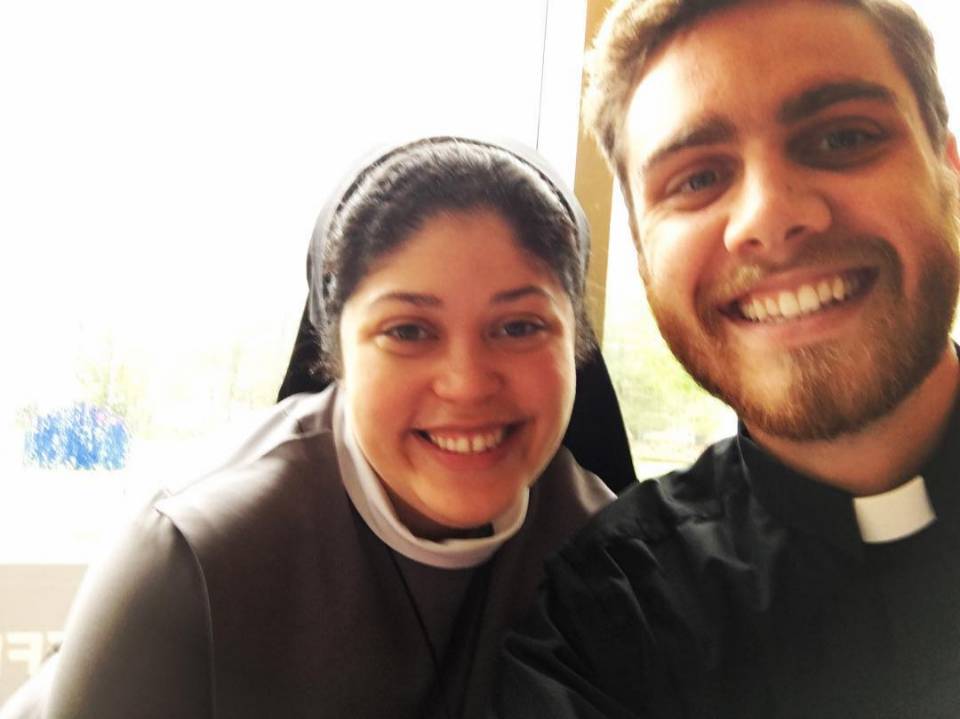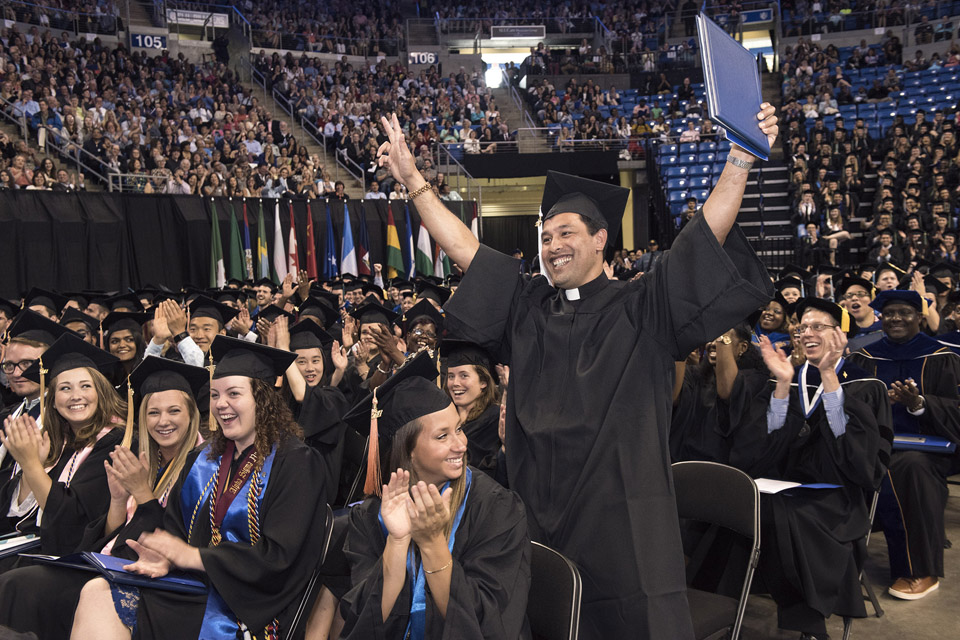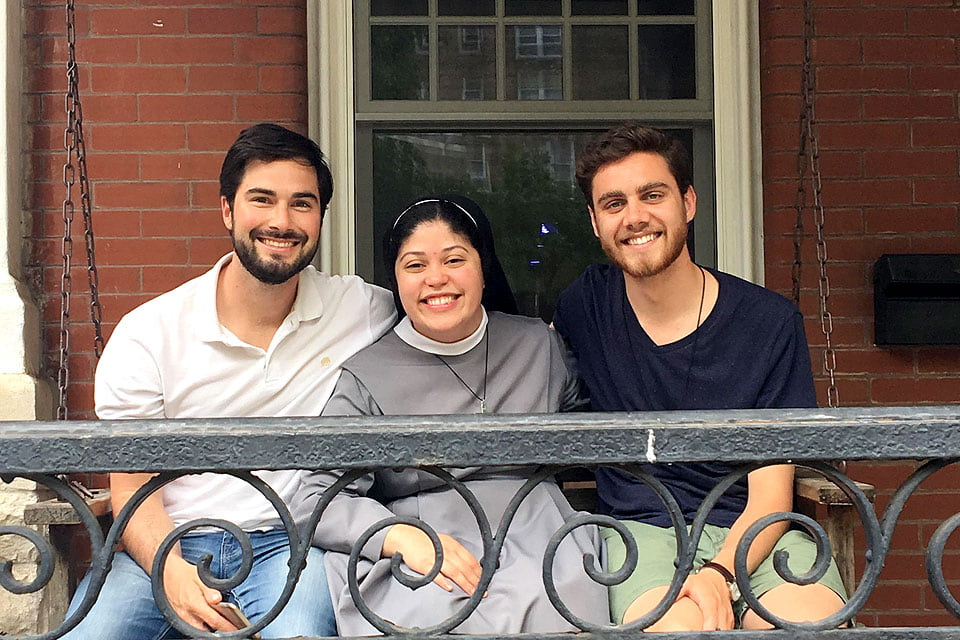Balancing Studies with the Sacred: Catholic Religious Find Academic and Spiritual Community at SLU
Jeanette Grider
Senior Media Relations Specialist
jgrider1@slu.edu
314-977-2538
Reserved for members of the media.
Adjusting to college life is a challenge for many students. But for Catholic men and women religious studying at Saint Louis University, the campus community becomes not only their academic home but a place to continue their spiritual formation while creating deep relationships that support them as they pursue their vocations.
Like other students, they can be found texting friends, hitting the books in Pius XII Memorial Library or grabbing a cup of joe on Fridays during the semester at Java with the Jesuits. But unlike many other students, the seminarians, priests, sisters, nuns and novices that study at SLU must balance their academic responsibilities with spiritual duties.
“In many educational settings today, grades and studies can easily become an idol that we think will satisfy all of our hopes,” William “Billy” Critchley-Menor, S.J., a SLU junior and Jesuit scholastic said, “Only God can do that. Studies can be a great help, but ultimately they only help us inasmuch as they make us more loving people and bring us closer to God. My religious life helps me remember and orient my studies to that end.”
Teaching to Ministry
While SLU holds a highly-regarded position among Jesuit colleges and universities for its role in educating young men who have recently entered the Society of Jesus, it also draws students from a wide variety of other Catholic orders and dioceses.
The University’s Department of Theological Studies sits at the heart of its College of Arts and Sciences. SLU’s Catholic Studies program recently welcomed Auxiliary Bishop Mark S. Rivituso of the Archdiocese of St. Louis to consecrate the program’s new chapel in Boileau Hall.
Recently, the University signed a historic agreement with the St. Louis Archdiocese to partner with Kenrick-Glennon Seminary. Under the agreement, the seminary’s students will complete their undergraduate education through SLU’s College of Philosophy and Letters.
The college, founded in 1889, is the one of the few schools of its kind at a Catholic university in the United States. Its programs have historically provided the philosophical and comprehensive intellectual background needed for young Jesuits studying for the priesthood. It opened to women religious in 1978 and has expanded to all students from there.
Now, the college is broadening its mission in hopes of preparing men and women from across faith traditions to embark on their specific ministries beyond SLU’s campus.
“We’re hoping to increase the interdisciplinarity of the program,” said William Rehg, S.J., a graduate of the college, said. Rehg studied in the college from 1978 to 1982 and returned to the SLU faculty in 1992. He’s been its dean since the summer of 2012. “I think the earlier focus was heavily on philosophy for theology.”
While students in the college still study theology and philosophy, their curriculum now includes a capstone class that brings each student’s specific interests and missions “front and center.” Past capstone projects have focused on gang prevention work in Guatamala, the nature of friendship in mission work in Guyana and the role of women in parish ministry.
These projects, Rehg explained, arose from students' own experiences in ministry and parish life. These experiences led students to connect their educations with real challenges they might encounter in active ministry.
“It’s also a learning community too,” Rehg noted.
Finding an Academic and Spiritual Home
The role religion plays in community has helped SLU senior Sister Mary Immanuela Pineiro, F.S.G.M., feel at home as she returned to college to complete her bachelor’s degree in psychology at the direction of her mother superior. A sister of the Franciscan Sisters of the Martyr St. George, Pineiro found her calling during her years at Catholic University in Washington, D.C. She’d begun attending Mass regularly as a way of staying connected to her family. Knowing they were at Mass at the same time she was helped ease homesickness, the sister recalled.
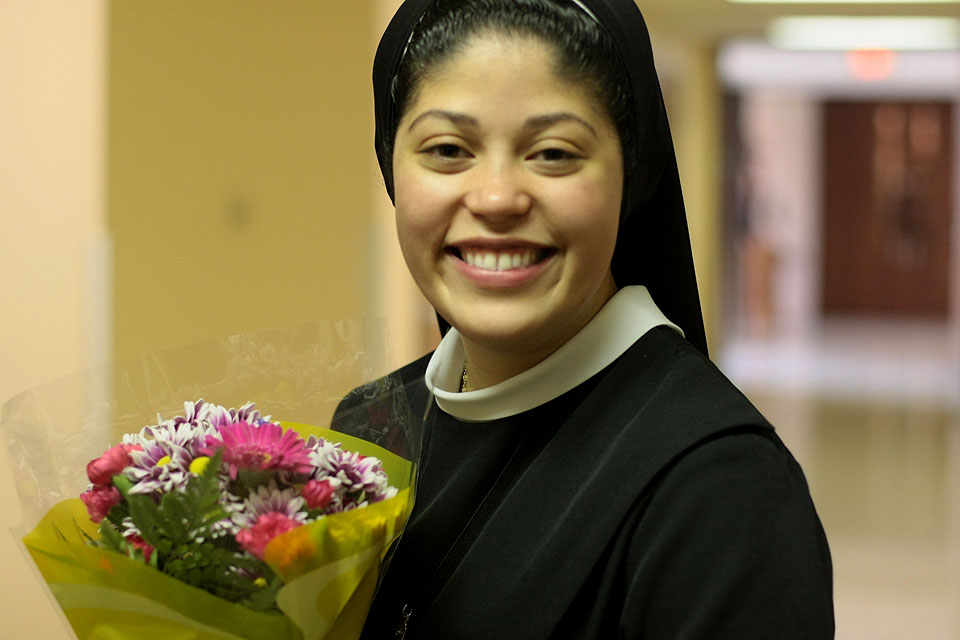
“I grew up in a very typical Catholic family,” Pineiro explained. “But it wasn’t until college that I developed a personal relationship with Jesus. The more time I spent in prayer, the more I saw the Lord filling.”
After spending time with sisters on a mission trip to the Philippines and college road trip with her roommate where she witnessed a final vows ceremony, she began to explore entering a community of women religious.
Eventually, Pineiro, a native of New York City, found herself in Alton, Illinois, as a novice, at the motherhouse of the Sisters of St. Francis of the Martyr St. George. The order arrived in Alton in 1925 and its charism is “To look on Him whom we have pierced and to make His merciful love visible.” As she pursued her formation as a sister, Pineiro said she was shocked – happily – by the reality of a religious life.
“I don’t know what idea I had of religious life, but that wasn’t it,” she said, laughing. “I’ll never forget the first time I saw the sisters playing ultimate Frisbee.”
Following time as a grade school teacher in Alton and study in elementary education at Benedictine University in Kansas, Pineiro was sent to serve at the Vatican Embassy in Washington, D.C. While there, she met Pope Francis on his 2016 visit.
“He definitely takes the cake,” Pineiro said. Working beside church leaders at the embassy and among her fellow sisters during the pope’s visit, “really made [her] fall in love with the Church.”
After her return to Alton, Pineiro’s superior asked her to resume her studies in psychology, on hold since her days at Catholic University, at SLU. Becoming a SLU student in the fall of 2016, Pineiro fell in love with the Billiken community she had now joined. She calls her order’s decision to send her back to school “a gift to help me flourish in my vocation.”
“Everyone was very welcoming,” she explained. “Because SLU is such a large and diverse place, I didn’t know what to make of it at first. But I liken SLU to real life.”
The campus’s faith community, filled with lay and fellow religious students, has also been eye-opening as she balances roles.
“I get up at 4:30 a.m. to pray at 5, but I still stay up late to write papers,” she said. “My professors really made me feel welcome and at ease.” While some students – and campus visitors – have asked her if her habit is real, she added that “creating those friendships that I didn’t expect as a sister was really what I hadn’t expected at SLU and that has been such a gift.”
She is also drawn to the deep connections between her own order’s charism – making Christ’s merciful love visible in the world – and SLU’s Jesuit mission.
“The whole mission of SLU is bringing truth to humanity,” Pineiro said. “I have found that truth and I want to bring that to the world for the greater glory of God. That’s why I love going to SLU – it’s all for the greater glory of God and I want to bring that to wherever I’m going next and to those I encounter in my ministry.”
Relating Mission to Life
For Pineiro’s good friend Critchley-Menor, studying at SLU has illustrated the need for the Ignatian charism. A native of Duluth, Minnesota, Critchley-Menor is a Jesuit scholastic. After two years of novitiate, he is finishing his undergraduate degree in philosophy and American Studies.
Growing up, Critchley-Menor wanted to be a priest and, during Eucharistic Adoration, the word “Jesuit” came to mind. Writing it down in a journal, he went home to look up information about the Society of Jesus.
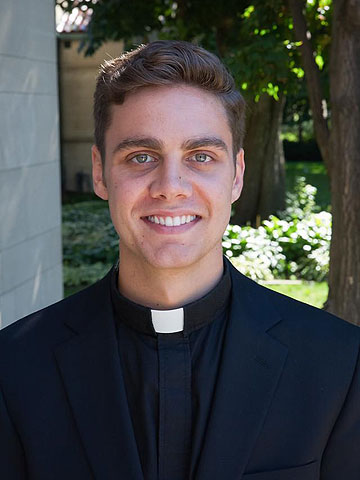
“After that, I never stopped thinking about it,” he recalled. “Ultimately I fell in love and am still in love with Jesus and the Catholic Church. For me, this is the fullest way I can experience God’s love and share it with the world.”
Critchley-Menor says prayer is essential to his collegiate experience. Daily Mass at Bellarmine House, the residence for Jesuit scholastics near SLU’s campus, is critical to his day.
“Without the routine of Mass, I’d risk forgetting how enchanted the world is,” Critchley-Menor explained. “I’d risk being robbed of the tremendous joy of a Eucharistic worldview. Ordinary and difficult things, failure and weakness are transformed into miraculous opportunities to receive God.”
I don’t know what idea I had of religious life, but that wasn’t it. I’ll never forget the first time I saw the sisters playing ultimate Frisbee.”
Sr. Mary Immanuela Pineiro, F.S.G.M., senior
His classes in American Studies, sociology, women’s and gender studies and involvement in Campus Ministry have illustrated the need for examining the world through a Jesuit lens, he said. And the friendships he’s developed with other religious like Pineiro are a reminder of the restorative nature of relationships in ministry.
“We share a lot about our prayer life, our joys and challenges in religious life, and a deep devotion to St. Therese of Lisieux,” he said. “However, we also share a lot of YouTube videos with each other, we procrastinate together in the library and we laugh a lot. For me, it is good to be friends with others who are seeking to make present the love of Jesus Christ on earth and walk with them in wondering at and pursuing that in a concrete way.”
Those relationships, he continued, extend beyond those in religious life to the campus as a whole, making SLU an even more vibrant faith community.
“God calls different people to experience his love in diverse ways,” Critchley-Menor noted. “I think it’s important in the Church that we experience and know that diversity of vocation. Today, more and more young people are leaving the Church and opting out of religion. I think our lives, and hopefully our joy, can present a certain paradox or least a question to ask about God’s existence and the value of religion. So our life is always and essentially evangelical. I think that is needed today.”
Founded in 1818, Saint Louis University is one of the nation’s oldest and most prestigious Catholic institutions. Rooted in Jesuit values and its pioneering history as the first university west of the Mississippi River, SLU offers nearly 13,000 students a rigorous, transformative education of the whole person. At the core of the University’s diverse community of scholars is SLU’s service-focused mission, which challenges and prepares students to make the world a better, more just place.


















